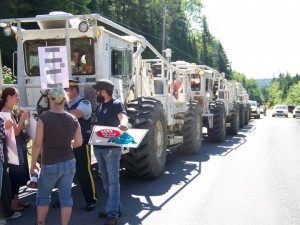
Hopewell Rocks
Here in New Brunswick, much of the expected shale gas extraction is around our biggest tourist attractions….including our own UNESCO Fundy Biosphere Reserve and the Hopewell Rocks.
But we are not alone in our desire to protect our treasured natural resources from an invasive industry.
Newfoundland has put a moratorium on shale gas exploration into effect, primarily over fears about effects on tourism around Gros Morne Park.
A resolution from the Union of Nova Scotia Municipalities supports a province-wide moratorium on hydraulic fracturing and calls for a dialogue about the practice of hydrofracking between First Nations, federal, provincial and municipal governments on potential impacts.
In the Prince Edward Island Legislature, on November 26th 2013, the Standing Committee on Agriculture, Environment, Energy and Forestry recommended a Moratorium on High Volume Hydraulic Fracking on PEI.
With existing moratoria in Quebec and New York, New Brunswick is now the only jurisdiction in our region pushing ahead with shale gas development.
Voters in the Colorado cities of Boulder, Fort Collins and Lafayette approved anti-fracking initiatives by wide margins in early November, despite an industrycampaign against the measures that cost at least $875,000.
Unifor, Canada’s largest private sector union (300,000 with 40,000 in the energy sector), called for a Canada-wide moratorium on all new oil and gas fracking. They have raised concerns about safety and environmental risks as well as the lack of
informed consent by First Nations about fracking activities on traditional lands.
Click here for our list of the New Brunswick municipalities and Provincial groups of all kinds that have called for a moratorium.
 Our government says not to worry about seismic testing, because it is only exploration.
Our government says not to worry about seismic testing, because it is only exploration.

